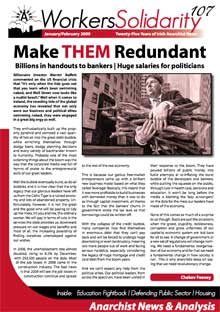Over 30 years of anarchist writing from Ireland listed under hundreds of topics
A Quick Guide to Social Welfare for the Newly Jobless
Workers Solidarity’s Vincent O’Malley spoke to his local Citizens Information Centre about some of the obstacles facing people who have lost their jobs.Q. What problems have people faced in accessing social welfare payments?
In terms of jobseekers’ benefit payments, people may not have paid enough social insurance (PRSI) to qualify. This may be due to a break in their work record, having been self-employed or, sometimes, due to their employer not passing on their PRSI contributions to the Department of Social and Family Affairs (DSFA). If they do qualify for a benefit payment, they can be waiting up to 12 weeks for a claim to be processed, although this will hopefully improve as the government has transferred 115 extra staff into social welfare offices.
If an individual does not qualify for a benefit payment, they can apply for assistance, or means-tested, payments. However, if they have a spouse or partner who is working full-time, they will only qualify for a reduced rate of Jobseekers' Allowance.
Q. What other issues do people face when applying for means-tested payments?
The means test applied is not always very fair. For example, money tied up in a retirement fund can be assessed against an applicant. The government has, in the past, run lavish advertisement campaigns encouraging people to save for the future, yet the DSFA insists that you must cash in and spend these funds, usually losing out hugely due to financial penalties, before you can qualify for a payment.
Also, an individual who may have bought and lived in a house in one part of the country, but has now had to move somewhere else in order to find work, will have to put that house up for sale in order to qualify for a jobseekers’ allowance payment, which will then only be paid for twelve months. So, again, while the government encourages us to be flexible in our efforts to find work, individuals are often stymied in this by the rules of the social welfare system.
Q. Reports of house repossessions are becoming more frequent in the media, what supports are available for people facing difficulties with mortgage repayments?
A major problem facing those who become unemployed is that, if their spouse or partner is working full-time, they will be disqualified from getting help with rent or mortgage interest payments, regardless of their salary level.
Also, community welfare officers, who administer these payments, can refuse to pay a mortgage interest supplement if they believe that the claimant will not be able to recommence making their payments in the near future of if they believe the house is not suitable for the individual or family concerned. Given current circumstances, this pretty much covers all applicants. Compounding this, community welfare officers are pretty much swamped with claims for payments and, as they are HSE employees, the recruitment embargo doesn’t allow extra staff to be taken on.
Q. What can people do if they have been refused a social welfare payment?
There are appeals systems in place within both the DSFA and HSE, which, while working within the constraints of the system, are quite fair. However, there are huge backlogs within the DSFA appeals system and there can be a wait of 12 months or more for a hearing. The HSE appeals system is also suffering from backlogs and while an appeal decision was generally made within 6 weeks a year ago, it is now taking between three and four months, sometimes longer. Again, the HSE recruitment embargo applies here.
This article is from Workers Solidarity 107 Jan/Feb 2009

You can read WS107 online or download the PDF file

